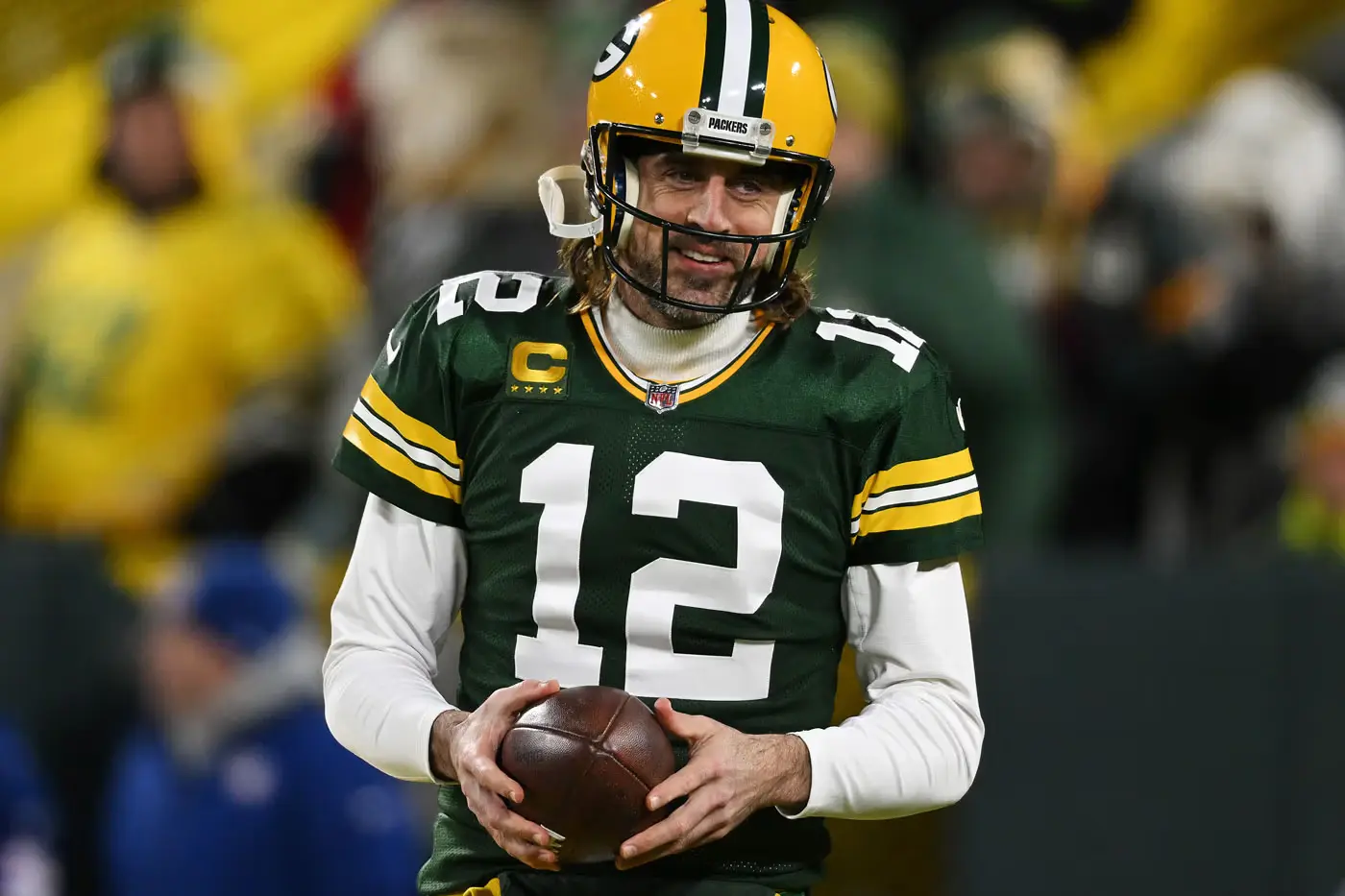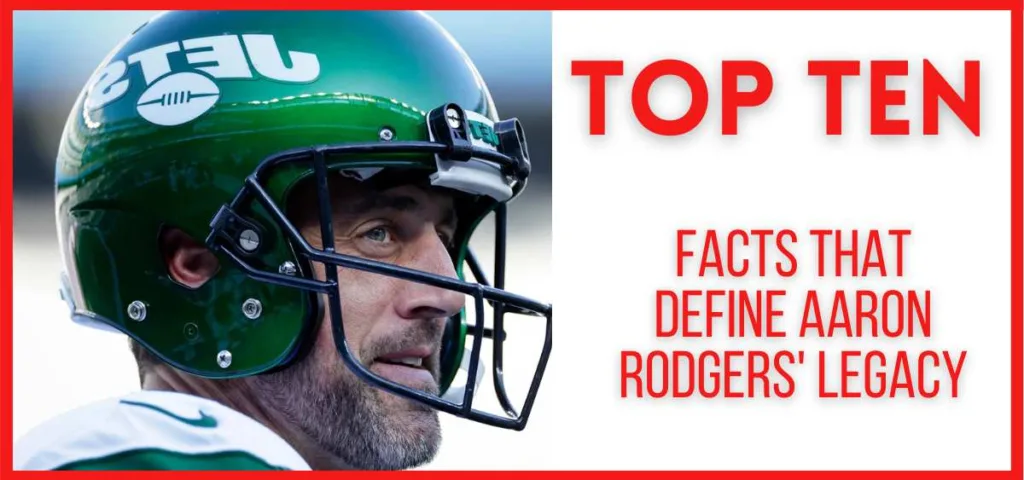Aaron Rodgers’ Legacy rise to greatness began in Chico, California, where a young Aaron, born in 1983, developed a passion for football at an early age. Though not heavily recruited out of high school, Aaron Rodgers’ talent shone at Butte College before transferring to the University of California, Berkeley. There, he honed his skills, setting school records and becoming a Heisman Trophy finalist. Drafted in the first round by the Green Bay Packers in 2005, Rodgers patiently waited his turn behind Brett Favre. When he finally took the reins in 2008, Aaron Rodgers’ legacy began to take shape.
He led the Packers to a Super Bowl victory in 2011, earning Super Bowl MVP honors. Throughout his career, Rodgers has racked up an impressive collection of accolades, including four NFL MVP awards (tying a league record) and boasting elite statistical accomplishments. His clutch performances under pressure and pinpoint accuracy, combined with a strong arm, have made him a nightmare for opposing defenses. Durable and mobile, Rodgers has defied expectations, maintaining a high level of play for nearly two decades. His legacy as a Green Bay Packers legend is likely set in stone, but with an uncertain future and recent off-field decisions sparking debate, only time will tell how the final chapter of Aaron Rodgers’ remarkable career unfolds.
Also, read: Top 10 richest sportsmen in the world
The Rodgers Era: Top 10 Facts That Define Aaron Rodgers’ Legacy
Aaron Rodgers, a name synonymous with excellence in the realm of American football, has left an indelible mark on the sport. As we delve into the top 10 facts that encapsulate his legacy, we unravel the journey of a player whose prowess extends beyond the field. From record-breaking achievements to leadership qualities that inspire generations, Rodgers’ impact transcends statistics. Join us as we explore the essence of a football icon.

1. Super Bowl Champion and MVP
Aaron Rodgers’ legacy isn’t complete without mentioning his crowning achievement: leading the Green Bay Packers to victory in Super Bowl XLV. Facing off against the Pittsburgh Steelers in 2011, Rodgers delivered a dominant performance, etching his name in Super Bowl history. He completed a significant portion of his passes, racking up over 300 yards and throwing three touchdowns.
His precision and poise under pressure were instrumental in the Packers’ win, ultimately earning him the coveted Super Bowl MVP title. This singular accomplishment cemented Rodgers’ status among the NFL’s elite quarterbacks, showcasing his ability to perform on the biggest stage and deliver a championship for his team.
Also, read: Ten Things That Most People Don’t Know About Justin Trudeau
2. Multiple League MVP Awards
Aaron Rodgers’ dominance extends far beyond a single stellar season. He holds a distinguished place among the NFL’s elite with a record-tying four Most Valuable Player awards (alongside Peyton Manning). His first MVP win came in 2011, following a season with an NFL-record passer rating and a Super Bowl victory. Rodgers didn’t stop there, adding MVP titles in 2014, 2020, and 2021.
These awards are a testament to his consistent excellence, showcasing his ability to elevate his team’s performance year after year. Whether it’s leading the league in touchdown passes or boasting an unmatched completion percentage, Rodgers’ MVP seasons are defined by statistical brilliance and a knack for leading the Packers to victories.
3. Elite Statistical Achievements
Aaron Rodgers’ legacy isn’t just defined by big moments, but also by the consistent excellence reflected in his statistics. Throughout his career, he’s amassed numbers that rank him among the all-time greats. His career passer rating sits well above 100, a mark of exceptional efficiency. He’s eclipsed the prestigious mark of 500 touchdown passes, showcasing his ability to find the end zone with pinpoint accuracy.
Furthermore, Rodgers boasts a completion percentage of over 65%, demonstrating his mastery of ball placement and decision-making. These aren’t just isolated achievements; they paint a picture of a quarterback who consistently elevates his team’s offense. Whether it’s dissecting defenses with surgical precision or launching bombs down the field, Aaron Rodgers’ statistical profile is a testament to his elite talent.
Also, read: Top 10 Things You Didn’t Know About Tom Brady
4. Clutch Performer
One of the defining features of Aaron Rodgers’ legacy is his ability to thrive under pressure. Nicknamed “Comeback Kid” for a reason, Rodgers has orchestrated numerous game-winning drives throughout his career. These clutch performances aren’t just about luck; they showcase his exceptional composure and ability to make pinpoint throws in critical moments.
Whether it’s the iconic Hail Mary touchdown to Randall Cobb against the Giants or the laser-focused sideline pass to Jared Cook that set up the winning field goal in Dallas, Rodgers’ clutch performances have left defenses bewildered and fans ecstatic. His calm demeanor and unwavering focus allow him to elevate his game when it matters most, making him a true master of leading comebacks and etching his name in NFL playoff history.
5. Accuracy and Arm Strength
Aaron Rodgers’ dominance as a quarterback hinges heavily on his remarkable accuracy and arm strength. He can thread the needle on throws into tight windows, leaving defenders grasping at air. This pinpoint precision is a product of years of dedication to mechanics and footwork. But his accuracy isn’t limited to short throws. Rodgers can unleash absolute lasers down the field, defying defenses with his ability to launch the ball on a dime over long distances.
This combination creates a nightmare scenario for defensive coordinators. They must respect Rodgers’ ability to hit short, precise throws, but doing so opens up deep passes for his talented receivers. This dual threat keeps defenses on edge and has made Aaron Rodgers one of the most dangerous and respected passers in NFL history.
Also, read: Ten things you didn’t know about Angelina Jolie
6. Mobility
Aaron Rodgers isn’t known for scrambling for yards like some quarterbacks, but his mobility shouldn’t be underestimated. While his pocket presence and ability to extend plays with his eyes are legendary, Rodgers has surprising athleticism. Throughout his career, he’s used his mobility to escape pressure, buy extra time for throws, and even pick up yards on the ground. This unexpected scrambling ability has frustrated defenses and led to big plays for the Packers. While not a primary rushing threat, Rodgers’ mobility adds another dimension to his game, making him even more dangerous as a quarterback.
7. Durability
One of the hallmarks of Aaron Rodgers’ remarkable career has been his exceptional durability. While quarterbacks often face the brunt of defensive pressure and are susceptible to injuries, Rodgers has remarkably avoided major setbacks throughout his playing time. This consistency has been a key factor in his sustained excellence. Unlike some quarterbacks who rely on athleticism and scrambling ability, Rodgers’ play extends beyond physical mobility. His exceptional pocket presence, awareness, and quick decision-making allow him to avoid unnecessary hits and extend plays when needed.
This focus on smart play, combined with a strong supporting cast on the offensive line, has minimized injuries and allowed Rodgers to stay on the field for extended stretches. This durability is a testament to his dedication to training and injury prevention, enabling him to consistently lead the Packers’ offense at a high level for nearly two decades.
Also, read: Top Ten Things You Should Know About Luka Doncic
8. Green Bay Packers Legacy
Aaron Rodgers’ legacy is inextricably linked to the Green Bay Packers. Drafted in 2005, he spent his entire career under the iconic Lambeau Field lights, becoming synonymous with the franchise’s success. Rodgers’ leadership culminated in a Super Bowl XLV victory, solidifying his place in Packers lore. Beyond the Lombardi Trophy, his numerous MVP awards and statistical dominance have cemented him as one of the greatest quarterbacks to ever wear the green and gold.
His durability and clutch performances have fueled thrilling victories, etching his name into the hearts of Packers fans for generations. While his future remains uncertain, Rodgers’ impact on the Green Bay Packers is undeniable. He will undoubtedly retire a Packer, leaving behind a legacy that will inspire future generations of quarterbacks to chase greatness in Titletown, USA.
9. Relationship with Fans
Aaron Rodgers’ relationship with Green Bay Packers fans has been a passionate one, filled with admiration for his talent and leadership on the field. His clutch performances and Super Bowl victory cemented his status as a legend. However, this bond has seen its share of strain in recent years. Rodgers’ public dissatisfaction with the organization, culminating in a trade request, left some fans feeling hurt and confused.
Additionally, his personal decisions haven’t always aligned with the image of a small-town team’s star player. Despite this, a large portion of the fanbase remains loyal, recognizing his immense contribution to the Packers’ success. Where their relationship goes from here depends on how Rodgers’ career unfolds and how he chooses to interact with the fans.
Also, read: Top Ten Things You Should Know About Jayson Tatum
10. Uncertain Future
Aaron Rodgers’ future hangs in the balance, casting a shadow over the final act of his incredible career. Despite his elite play, Rodgers has hinted at retirement, leaving fans to wonder how much longer they can enjoy his magic. The Green Bay Packers are also at a crossroads, with their championship window potentially closing. Will Rodgers return and attempt another Super Bowl run in Green Bay, or will he seek greener pastures elsewhere?
The possibility of a trade adds another layer of intrigue. While Rodgers’ talent remains undeniable, questions about team fit and his desire to continue playing will dominate headlines until a decision is made. This uncertainty adds a fascinating wrinkle to Aaron Rodgers’ legacy, leaving fans to wonder how the final chapter will be written.
FAQs about Aaron Rodgers’Legacy
Q. Is Aaron Rodgers a Hall of Famer?
Absolutely. His Super Bowl win, MVP titles, and incredible stats guarantee his enshrinement in Canton.
Also, read: Top Ten Things You Should Know About Kevin Durant
Q. How does Aaron Rodgers compare to other NFL quarterbacks?
Rodgers is considered one of the greatest quarterbacks of all time. He’s in the conversation with legends like Joe Montana, Tom Brady, and Peyton Manning.
Q. What are Aaron Rodgers’ biggest weaknesses?
While incredibly talented, Rodgers can struggle with mobility and sometimes force throws. His recent offfield decisions have also impacted his public image.
Q. Will Aaron Rodgers retire as a Green Bay Packers?
Most likely. He’s identified strongly with the Packers throughout his career and seems likely to finish there.
Q. What will define the final chapter of Aaron Rodgers’ career?
His performance in the coming seasons and where he decides to retire will significantly shape how his legacy is ultimately viewed.
Conclusion: The Final Words on Aaron Rodgers’ Legacy
Aaron Rodgers’ legacy in the NFL is a testament to his exceptional talent, unwavering dedication, and competitive spirit. His ability to consistently elevate his team’s performance and deliver clutch plays under pressure has solidified his status as one of the greatest quarterbacks of all time. From his record-breaking statistics to his Super Bowl victory and countless MVP awards, Rodgers’ impact on the game is undeniable.
While his playing career may come to an end someday, his legacy will continue to inspire future generations of quarterbacks. Rodgers’ ability to combine physical skills with mental acuity and leadership qualities sets him apart from his peers. His impact on the Green Bay Packers organization and the NFL as a whole will be felt for years to come. As the final chapter of Aaron Rodgers’ career unfolds, it is clear that his legacy as one of the greatest quarterbacks in NFL history is already cemented.
Also, read: Top Ten Things You Should Know About LeBron James


































